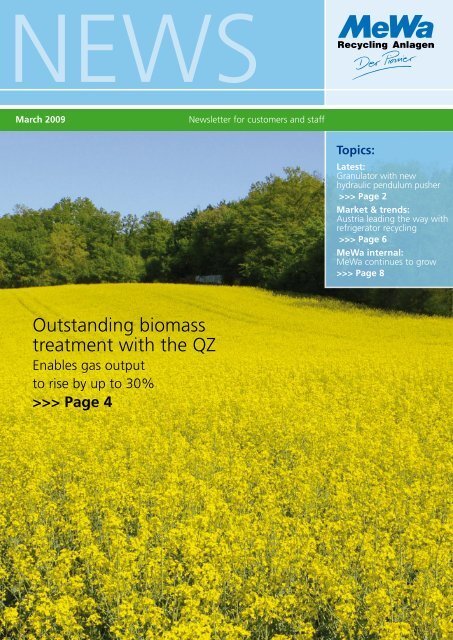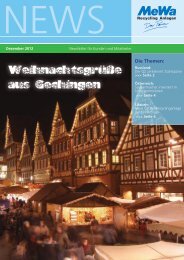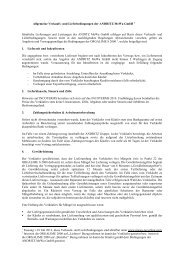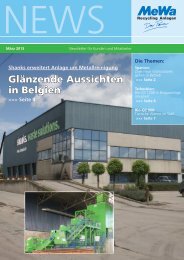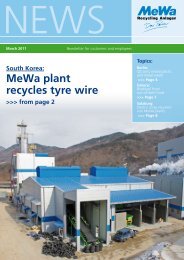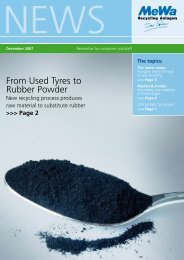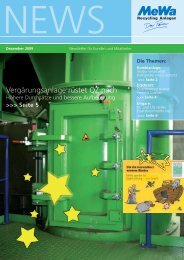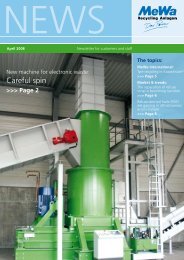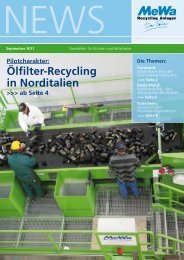Outstanding biomass treatment with the QZ - MeWa Recycling ...
Outstanding biomass treatment with the QZ - MeWa Recycling ...
Outstanding biomass treatment with the QZ - MeWa Recycling ...
Create successful ePaper yourself
Turn your PDF publications into a flip-book with our unique Google optimized e-Paper software.
NEWS<br />
March 2009<br />
<strong>Outstanding</strong> <strong>biomass</strong><br />
<strong>treatment</strong> <strong>with</strong> <strong>the</strong> <strong>QZ</strong><br />
Enables gas output<br />
to rise by up to 30%<br />
>>> Page 4<br />
Newsletter for customers and staff<br />
Topics:<br />
Latest:<br />
Granulator <strong>with</strong> new<br />
hydraulic pendulum pusher<br />
>>> Page 2<br />
Market & trends:<br />
Austria leading <strong>the</strong> way <strong>with</strong><br />
refrigerator recycling<br />
>>> Page 6<br />
<strong>MeWa</strong> internal:<br />
<strong>MeWa</strong> continues to grow<br />
>>> Page 8
Latest news<br />
Granulator <strong>with</strong> new hydraulic<br />
pendulum pusher<br />
It’s been ten years since <strong>the</strong><br />
first 1608 series <strong>MeWa</strong> Granulator<br />
left production to be delivered<br />
to Gescher in <strong>the</strong> Münsterland<br />
region. It proved a huge<br />
success and now, some 35,000<br />
operating hours later, <strong>the</strong> customer<br />
Hubert Eing Kunststoffverwertung<br />
GmbH has replaced<br />
<strong>the</strong> original <strong>with</strong> an updated<br />
version incorporating a hydraulic<br />
pendulum pusher.<br />
I<br />
t just never stops operating. With its<br />
low-wear blade blocks, <strong>the</strong> <strong>MeWa</strong><br />
UG Universal Granulator is particu-<br />
Typical content:<br />
Mixed plastic waste<br />
larly used for shredding<br />
tyres, cables, oil<br />
filters, domestic, industrial<br />
and residential<br />
waste and plastics.<br />
This versatile<br />
post-disintegrator’s<br />
reliability is making<br />
it one of <strong>the</strong><br />
true success stories<br />
in <strong>MeWa</strong>’s machine<br />
fleet.<br />
With improved<br />
blade geometry and<br />
a hydraulic pendulum<br />
pusher, this updated,<br />
state-of-<strong>the</strong>-art model can now<br />
process even greater throughput quantities<br />
compared to <strong>the</strong> original UG 1608 series.<br />
Advances have also been made <strong>with</strong><br />
its mechanical handling. With <strong>the</strong> new hydraulic<br />
pusher, both pendulum and cylinder<br />
are external. As well as being very<br />
low-maintenance, this arrangement also<br />
prevents contamination from material residue.<br />
“The cutting geometry of this machine<br />
matches our requirements profile perfectly,“<br />
says Stephan Eing, managing director<br />
of Hubert Eing Kunststoffverwertung<br />
GmbH, describing <strong>the</strong> reasons <strong>the</strong> company<br />
once again chose <strong>the</strong> <strong>MeWa</strong> Granulator<br />
for <strong>the</strong>ir recent replacement investment.<br />
The UG 1608 <strong>with</strong> hydraulic pendulum pusher.<br />
The family-run company ordered its first<br />
1608 series <strong>MeWa</strong> Granulator 10 years<br />
ago. Based in Gescher, <strong>the</strong> company mechanically<br />
treats some 40,000 tonnes of<br />
plastics from Dual System collection bins<br />
for outer packaging. The material is shredded,<br />
extraneous materials are separated<br />
and <strong>the</strong>n mechanically recycled. In addition,<br />
<strong>the</strong> company produces around 60,000<br />
tonnes of derived fuels per year from processing,<br />
industrial and municipal waste.<br />
The materials are treated using flexible<br />
processing to ensure homogenous output<br />
fractions. Determining <strong>the</strong> desired particle<br />
size is simple using <strong>the</strong> quick-change<br />
perforated screen in <strong>the</strong> granulator. The<br />
principal customers for <strong>the</strong> refuse-derived<br />
fuels are from <strong>the</strong> power station, cement<br />
and lime industry. ■<br />
Homogenous <strong>treatment</strong> for refuse<br />
derived fuel.<br />
Münsterland<br />
The riches of <strong>the</strong> Münsterland<br />
region are located amid sprawling<br />
green grasslands interspersed <strong>with</strong><br />
woods, hedge banks and <strong>the</strong> gardens<br />
of old farmhouses – magnificent palaces<br />
and imposing castles (like Burg<br />
Gemen near Borken).<br />
The region is popular for cycling tourism.<br />
The region’s most attractive sights<br />
can be found on <strong>the</strong> “Route of 100<br />
palaces and castles“, a cycling route<br />
stretching almost 100 kilometres.<br />
<strong>MeWa</strong>-News March 2009
Tyre recycling plant<br />
in Kazakhstan taking shape<br />
When’s <strong>the</strong> summer going to start<br />
for real? This old German song<br />
could scarcely have expressed<br />
<strong>the</strong> wishes of <strong>the</strong> <strong>MeWa</strong> fitters better during<br />
<strong>the</strong> erection work in Kazakhstan. And<br />
no wonder, <strong>with</strong> minus temperature deep<br />
into double figures. Kazakhstan’s continental<br />
climate is characterised by its cold<br />
winters. Even in <strong>the</strong><br />
factory, <strong>the</strong> <strong>the</strong>rmometer<br />
sank to below minus<br />
25 degrees Celsius<br />
at times.<br />
Thick gloves, coats<br />
and boots were <strong>the</strong><br />
order of <strong>the</strong> day. “Our saying was: just<br />
keep moving,“ says <strong>MeWa</strong> mechanic<br />
Lothar Riedel, talking about <strong>the</strong> assembly<br />
work during <strong>the</strong> long Kazakh<br />
winter. It appears <strong>the</strong> team heeded this<br />
advice though as <strong>the</strong> assembly quickly<br />
ga<strong>the</strong>red pace. By now, <strong>the</strong> complete preshredder<br />
toge<strong>the</strong>r <strong>with</strong> granulators and all<br />
<strong>the</strong> electrics are ready for commissioning<br />
at <strong>the</strong> site. The start of March saw <strong>the</strong> second<br />
part of <strong>the</strong> plant set off for <strong>the</strong> Asian<br />
territorial state.<br />
<strong>MeWa</strong>-News March 2009<br />
This steel structure,<br />
toge<strong>the</strong>r <strong>with</strong> its<br />
integrated machinery,<br />
forms a construction kit<br />
which can be assembled<br />
piece by piece.<br />
Tyres shredded to granulate pass<br />
through an intricate purification process<br />
in <strong>the</strong> plant. The granulate purification<br />
unit, which has separation stages arranged<br />
on three levels, was fully preassembled beforehand<br />
in <strong>the</strong> new assembly hall at <strong>the</strong><br />
<strong>MeWa</strong> site in Gechingen.<br />
Sophisticated separation<br />
technology separates<br />
fibrous materials,<br />
steel wire, stones<br />
and rubber from one<br />
ano<strong>the</strong>r. At <strong>the</strong> end,<br />
<strong>the</strong> rubber granulate is<br />
99.95-weight-per-centfree<br />
of extraneous materials and is ready<br />
to be sold in various quantities.<br />
To ensure smooth and efficient assembly<br />
of <strong>the</strong> plant in Kazakhstan, it was<br />
loaded into standard freight containers in<br />
entire sections. This steel structure, toge<strong>the</strong>r<br />
<strong>with</strong> its integrated machinery, forms<br />
a construction kit which can be assembled<br />
piece by piece. Delivery is expected in <strong>the</strong><br />
capital Astana after Easter. By <strong>the</strong>n, it will<br />
virtually be <strong>the</strong> start of <strong>the</strong> hot season.<br />
Latest news<br />
Autumn saw <strong>the</strong> first<br />
section of <strong>the</strong> new tyre<br />
recycling plant set off for<br />
Kazakhstan. The shredding<br />
lines were erected<br />
in extreme climate conditions<br />
and <strong>the</strong> complete<br />
granulate purification<br />
unit followed soon after.<br />
And during <strong>the</strong> hot continental summer<br />
months in Kazakhstan, <strong>the</strong> sweat will flow.<br />
Then, no doubt, many a fitter will be dreaming<br />
of ice-cold refreshments! ■<br />
The pre-shredder and granulation unit have<br />
already arrived in Kazakhstan.<br />
Wrapped up warm: <strong>the</strong> <strong>MeWa</strong> team<br />
defy <strong>the</strong> cold.
Market & trends<br />
<strong>Outstanding</strong> <strong>biomass</strong><br />
<strong>treatment</strong> <strong>with</strong> <strong>the</strong> <strong>QZ</strong><br />
Enables gas output to rise by up to 30%<br />
S<br />
Josef Kröll has been operating a state-of-<strong>the</strong>-art<br />
biogas system in Zillertal, Austria since <strong>the</strong> start<br />
of 2008. In order to treat <strong>the</strong> bio waste, <strong>the</strong> farmer<br />
uses <strong>the</strong> <strong>MeWa</strong> Querstromzerspaner – <strong>with</strong><br />
resounding success.<br />
chlitters is a family-friendly holiday<br />
village located at <strong>the</strong> entrance to Zillertal,<br />
popular <strong>with</strong> tourists above all<br />
because of its sunny location and magnificent<br />
surrounding countryside. This combination<br />
of agriculture, tourism and environmental<br />
protection<br />
also plays a key role in <strong>the</strong><br />
state-of-<strong>the</strong>-art plant at<br />
Biogas Schlitters GmbH.<br />
In an eco-friendly process,<br />
<strong>the</strong> plant in Schlitters<br />
produces electricity,<br />
heat and compost from around 6,000<br />
tonnes of municipal bio waste, food waste<br />
from various tourist hotels, bed and breakfasts<br />
and guest houses using food which<br />
is out of date or frozen but still packaged<br />
from supermarkets and stores.<br />
A key role in <strong>the</strong> plant design, which<br />
is by Finsterwalder Umwelttechnik GmbH<br />
(Fitec) from Bernau in Bavaria, is played<br />
by a recycling technology machine: all bio<br />
waste initially lands in <strong>the</strong> patented <strong>MeWa</strong><br />
Querstromzerspaner (<strong>QZ</strong>) for <strong>treatment</strong>.<br />
The machine forms an enclosed system<br />
and, in contrast to conventional shredding<br />
techniques, is fit-<br />
The chains of <strong>the</strong> <strong>MeWa</strong><br />
Querstromzerspaner<br />
work like a<br />
mortar crushing herbs.<br />
ted <strong>with</strong> chains ra<strong>the</strong>r<br />
than blades too. This<br />
is immediately associated<br />
<strong>with</strong> several<br />
benefits.<br />
• Higher gas output<br />
Whereas machine systems <strong>with</strong><br />
blades merely shred organic waste,<br />
<strong>the</strong> chains on <strong>the</strong> <strong>QZ</strong> work like a<br />
mortar crushing herbs. This process gives<br />
rise to a considerably larger surface area.<br />
In <strong>the</strong> ensuing fermentation process, a<br />
significantly larger contact surface is provided<br />
for <strong>the</strong> bacteria. The retention time<br />
of <strong>the</strong> <strong>biomass</strong> in <strong>the</strong> fermenter is speeded<br />
up and gas output is <strong>the</strong>refore increased<br />
significantly.<br />
• Optimal <strong>treatment</strong> of substrate<br />
The type and composition of <strong>the</strong> quantities<br />
delivered to Schlitters each day fluctuates.<br />
Operators can react to this by varying<br />
retention times and formulations in<br />
<strong>the</strong> Querstsromzerspaner. Latterly <strong>the</strong> <strong>QZ</strong><br />
has even replaced <strong>the</strong> o<strong>the</strong>rwise conventional<br />
mixer. At <strong>the</strong> end, an optimally treated<br />
substrate is produced. Contamination<br />
by odours is also reduced considerably<br />
due to <strong>the</strong> enclosed system.<br />
• Opening of packages<br />
The machine can also open packaged<br />
food, plastic bags and deep-frozen meals.<br />
In a subsequent separation stage, <strong>the</strong>se<br />
packages can also be separated from organic<br />
substances.<br />
<strong>MeWa</strong>-News March 2009
• Metal parts are no problem<br />
The machine is not sensitive to <strong>the</strong> metal<br />
parts that are also frequently found in<br />
bio waste. The axle of a collection barrel<br />
or mineral parts such as stones or concrete<br />
slabs are no obstacle for <strong>the</strong> <strong>QZ</strong>. Indeed<br />
<strong>the</strong> recycling machine was actually originally<br />
designed for metal compounds.<br />
In a last step, <strong>the</strong> substrate is homogenised<br />
in just one operation and treated<br />
making it ideal for <strong>the</strong> bacteria in <strong>the</strong><br />
fermenter. “Opening packaging <strong>with</strong> <strong>the</strong><br />
Querstromzerspaner replaces a biological<br />
pre-<strong>treatment</strong> phase which would o<strong>the</strong>rwise<br />
have to be carried out using hydrolysis,“<br />
explains plant construction engineer<br />
Klemens Finsterwalder.<br />
A separator finally separates extraneous<br />
materials such as bones or wooden<br />
pieces, metal or foil packaging. The <strong>biomass</strong><br />
is <strong>the</strong>n sanitised and conducted to<br />
<strong>the</strong> fermenter where liquid manure from<br />
agriculture is added.<br />
For plant operator, Josef Kröll, investment<br />
in <strong>the</strong> Querstromzerspaner has already<br />
paid off. In Schlitters, <strong>the</strong> expected<br />
increase in biogas output was taken into<br />
account early on at <strong>the</strong> design stage. A<br />
block heating station converts <strong>the</strong> output<br />
at <strong>the</strong> end to heat and 330 kW electrical<br />
<strong>MeWa</strong>-News March 2009<br />
The <strong>QZ</strong> 900’s <strong>treatment</strong><br />
of <strong>biomass</strong> is impressive.<br />
energy. All that is left at <strong>the</strong> last is fermentation<br />
residue.<br />
“This not only smells more pleasant<br />
than liquid manure, it is better fertiliser<br />
too,“ explains Josef Kröll. This means <strong>the</strong><br />
ecological balance in Schlitters is harmonious<br />
and <strong>the</strong> countryside – <strong>the</strong> most<br />
valuable resource in this tourism region –<br />
profits most. ■<br />
Market & trends<br />
Typical content of a bio waste collection barrel.<br />
Input: packaged food.<br />
Output: perfectly treated substrate<br />
Plastics can be separated easily.<br />
System control via computer:<br />
Josef Kröll at his workstation.
<strong>MeWa</strong>-International<br />
Commissioning: Egbert Tölle, REMONDIS board;<br />
Michaela Hinterholzer, Austrian MP; Ernest<br />
Gabmann, deputy state governor; Dr Helmut<br />
Kolba, managing director UFH RE-cycling; Elmar<br />
Kniesel, <strong>MeWa</strong> assembly manager; Gerhard Jokic,<br />
managing director UFH RE-cycling; Juliana Gün<strong>the</strong>r,<br />
mayor of Kematen (from left to right).<br />
Austria leading <strong>the</strong> way <strong>with</strong><br />
refrigerator recycling<br />
When it comes to environmental<br />
protection, Austria is<br />
considered a flagship country.<br />
The country’s politicians <strong>the</strong>refore<br />
rightly appeared proud<br />
at <strong>the</strong> commissioning of a<br />
state-of-<strong>the</strong>-art refrigerator<br />
recycling plant in Kematen<br />
near Linz in February 2009.<br />
W<br />
ith <strong>the</strong> project in Kematen<br />
“We are setting new standards<br />
for refrigerator disposal<br />
in Europe.“ Both Ernest Gabmann,<br />
deputy state governor of Lower Austria<br />
and Dr Leopold Zahrer from <strong>the</strong> Austrian<br />
Ministry for <strong>the</strong> Environment were in<br />
agreement on this in <strong>the</strong> speeches <strong>the</strong>y<br />
gave on <strong>the</strong> occasion of <strong>the</strong> inauguration<br />
of <strong>the</strong> new plant. At <strong>the</strong> new waste<br />
disposal operation, up to 300,000 refrigerators<br />
will be treated each year and<br />
90 tonnes of CFCs gained. The plant’s<br />
operation will correspond to a saving to<br />
<strong>the</strong> environment of 900,000 tonnes of<br />
CO 2 each year.<br />
Use of CFCs was banned in Germany<br />
in 1996 when <strong>the</strong> refrigerant was<br />
identified as ozone depletant number 1.<br />
Despite this law, <strong>the</strong> number of CFC refrigerators<br />
still in operation throughout<br />
Europe is estimated at more than 200<br />
million. This generation of refrigerators<br />
is now reaching <strong>the</strong> recycling plants.<br />
“The plant enables CFC and pentane<br />
refrigerators to be processed simultaneously<br />
<strong>with</strong>out having to be separated<br />
beforehand,“ explains <strong>MeWa</strong><br />
managing director Helmut Oberguggen-<br />
berger talking about <strong>the</strong> plant’s advantages.<br />
Besides <strong>the</strong> extraordinarily high<br />
rate of CFCs regained, investors were<br />
impressed by <strong>the</strong> plant’s economic operation<br />
and results.<br />
With its rotating chains, <strong>the</strong> <strong>MeWa</strong><br />
Querstromzerspaner (<strong>QZ</strong>) exposes <strong>the</strong><br />
individual fractions from <strong>the</strong> refrigerators<br />
in just one processing step. In doing<br />
so, <strong>the</strong> <strong>QZ</strong> separates <strong>the</strong> material compounds<br />
of <strong>the</strong> refrigerators into iron, aluminium,<br />
copper and plastic. At <strong>the</strong> end,<br />
<strong>the</strong> secondary raw materials are fed into<br />
containers ready for collection as category<br />
1 cooling waste for sale.<br />
“The latest technology enables almost<br />
95 % of all materials from a refrigerator<br />
to be regained as raw materials<br />
for new products,“ explains Dr Helmut<br />
<strong>MeWa</strong>-News March 2009
Kolba, managing director of <strong>the</strong> newly<br />
founded UFH <strong>Recycling</strong> GmbH based<br />
in Vienna. The future operating company<br />
is a joint venture of UFH Holding<br />
GmbH, <strong>the</strong> market leader among Austrian<br />
collection and recycling systems and<br />
REMONDIS, one of <strong>the</strong> world’s largest<br />
service providers in <strong>the</strong> area of closed<br />
loop recycling management.<br />
In an initial step, all recyclable components<br />
such as cables and glass deposits<br />
are removed. Next, environmentally<br />
harmful refrigerators and <strong>the</strong> compressor<br />
oil are drained off by specialists and<br />
<strong>the</strong> compressors are removed from <strong>the</strong><br />
old refrigerators. The <strong>QZ</strong> 2000 <strong>the</strong>reafter<br />
processes around 50 to 60 refrigerators<br />
<strong>MeWa</strong>-News March 2009<br />
per hour in an insulated system. The<br />
shredded PUR foam is sieved off and<br />
free from CFC residue. Environmentally<br />
harmful gases are finally cooled down<br />
in cryogenic condensation, liquefied<br />
<strong>the</strong>n collected in special reservoirs before<br />
being disposed of later. After <strong>the</strong><br />
<strong>QZ</strong>, mechanical processes separate <strong>the</strong><br />
iron and o<strong>the</strong>r metals and plastics from<br />
one ano<strong>the</strong>r.<br />
30 employees working in three shifts<br />
toge<strong>the</strong>r <strong>with</strong> state-of-<strong>the</strong>-art mechanical<br />
engineering ensure a high turnover<br />
of around 1,000 refrigerators per<br />
day. Therefore <strong>the</strong> entire requirements<br />
of <strong>the</strong> Alpine Republic are covered by<br />
<strong>the</strong> new plant. ■<br />
<strong>MeWa</strong>-International<br />
Homogenous output:<br />
Aluminium and copper fraction.<br />
The <strong>MeWa</strong> team has built <strong>the</strong> refrigerator recycling system in just<br />
eight months’ construction time so it is ready for commissioning:<br />
Elmar Kniesel, Jens Holzbach, Hans-Gerd Wilke, Mustafa Smailovic,<br />
Daniel Treyer, Wilhelm Schöffler (from left to right).<br />
Degassing system Stage 1.
<strong>MeWa</strong> internal<br />
<strong>MeWa</strong> continues to grow<br />
<strong>MeWa</strong> has 35 new employees.<br />
The <strong>MeWa</strong> sales team.<br />
New faces in management<br />
Helmut<br />
Oberguggenberger<br />
I<br />
Helmut<br />
Wiedemann<br />
n line <strong>with</strong> growth, MeWA has fur<strong>the</strong>r<br />
adjusted its organisational structures<br />
in accordance <strong>with</strong> <strong>the</strong> increased challenges<br />
of <strong>the</strong> market. In this context, Helmut<br />
Wiedemann was appointed to <strong>the</strong><br />
management team at <strong>the</strong> start of 2009.<br />
In <strong>the</strong> future, <strong>the</strong> qualified technician<br />
and mechanical engineer will lead <strong>the</strong><br />
The picture at <strong>MeWa</strong>’s end-of-year<br />
celebration for 2008 was an impressive<br />
one as it showed all 35<br />
colleagues who have joined <strong>the</strong> company<br />
over <strong>the</strong> last two years.<br />
During this period, <strong>the</strong> number of employees<br />
has risen by almost a third but<br />
this is not <strong>the</strong> only reason for <strong>the</strong> positive<br />
mood <strong>with</strong>in <strong>the</strong> company. Despite <strong>the</strong> difficult<br />
economic situation generally, <strong>MeWa</strong><br />
entered 2009 <strong>with</strong> a satisfying volume of<br />
orders and hence <strong>with</strong> great confidence.<br />
The key to this success is <strong>MeWa</strong>’s proven<br />
company toge<strong>the</strong>r <strong>with</strong> managing partner<br />
Heimo Wabnig and Helmut Oberguggenberger<br />
and Ulrich Hink, who are also<br />
part of <strong>the</strong> management team. Helmut<br />
Wiedemann has occupied a leading role<br />
in <strong>the</strong> company for <strong>the</strong> past few years as<br />
construction design and operations manager.<br />
In future, <strong>the</strong> 52-year-old from Al<strong>the</strong>ngstetten<br />
will also assume <strong>the</strong> role of<br />
technical managing director.<br />
Starting from 1 January 2009, Helmut<br />
Oberguggenberger was awarded sole<br />
power of representation. This means that,<br />
in <strong>the</strong> future, he can represent <strong>the</strong> company<br />
on his own in dealings <strong>with</strong> third parties.<br />
Originating from Carinthia, Mr Oberguggenberger<br />
has been part of <strong>MeWa</strong><br />
management since 2005. ■<br />
quality when it comes to product, planning,<br />
service and consultation.<br />
With a view to continuing to provide<br />
this standard in <strong>the</strong> future, <strong>the</strong> entire<br />
<strong>MeWa</strong> sales met at <strong>the</strong> start of <strong>the</strong> year for a<br />
major conference which was used for an<br />
intensive exchange of experiences. ■<br />
<strong>MeWa</strong>-News<br />
Imprint<br />
Publisher:<br />
<strong>MeWa</strong> <strong>Recycling</strong> Maschinen<br />
und Anlagenbau GmbH<br />
Gültlinger Straße 3, 75391 Gechingen<br />
Tel. 0049 (0)7056 925-0<br />
E-Mail: info@mewa-recycling.de<br />
Internet: www.mewa-recycling.de<br />
Editor: Harald Pandl<br />
Printing: Druckhaus Weber GmbH,<br />
Al<strong>the</strong>ngstett<br />
Design: <strong>MeWa</strong> toge<strong>the</strong>r <strong>with</strong><br />
Creativ-Werbung M. Dostal, Tiefenbronn<br />
Photo credits: <strong>MeWa</strong>, Münsterland e.V.<br />
Title picture: Canola field<br />
Publication: 4 times a year<br />
"Kudder" – that is what <strong>the</strong> Swabians<br />
call odds and ends or swept<br />
up dirt. All this is put in a dustbin<br />
("Kudderoimer"). Here we would<br />
like to collect anything special,<br />
curious or funny from <strong>the</strong> recycling<br />
sector. Ideas welcome.<br />
Rubber hands.<br />
<strong>MeWa</strong>-News March 2009


